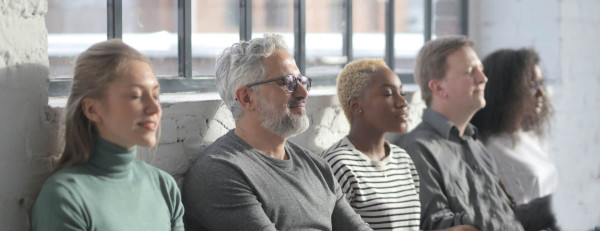How Mindfulness Builds Self-Regulation and Emotional Resilience
20 June 2025

Self-regulation is the ability to flexibly shift your emotional or physical state, especially in moments of stress, anxiety, or overwhelm. Learning how to regulate your nervous system in healthy, sustainable ways is key to managing daily challenges—and building long-term resilience and well-being.
In this post, we’ll explore two key pathways of self-regulation: regulating through your own inner resources and through relationships with others. We’ll also look at how mindfulness meditation can be a powerful tool to support both.
What is Self-Regulation?
Self-regulation refers to the capacity to manage your emotions, behaviour and physical state. It's about being able to soothe yourself when you're anxious or upset—and to re-energise when you feel low or disengaged.
There are two main types of self-regulation:
- Self-regulation through inner strategies
- Self-regulation through connection with others
Each has its strengths, and most of us have a natural tendency to rely more heavily on one than the other.
1. Self-Regulation Through Your Own Resources
This includes any strategy you use to shift your internal state by yourself. These might be supportive and healthy—like meditation, exercise, mindful breathing, or cooking. Or they might offer short-term relief but have longer-term costs—like excessive alcohol, overeating, compulsive work, or even aggression.
Examples of self-regulation using internal strategies:
- Practicing mindfulness or breath awareness
- Eating (or not eating) to manage emotion
- Drinking alcohol or using drugs
- Engaging in physical activity or hitting something
- Working or staying busy
- Going for a walk or immersing in a hobby
While some of these tools can soothe you temporarily, they’re not all equally supportive of your well-being in the long run. That’s where mindful awareness can help—by making your responses more conscious and intentional.
2. Self-Regulation Through Social Connection
This involves shifting your state by engaging with others—like talking with a friend, venting to a partner, getting a hug, going to therapy, or even picking a fight. These interactions can be grounding and help restore a sense of connection and safety.
Examples of social regulation strategies:
- Sharing your day with a partner or friend
- Processing emotions with a therapist
- Seeking comfort through intimacy or touch
- Arguing or venting frustration
- Relying on companionship for grounding
Again, some strategies build connection, while others—like dumping or escalating conflict—can be draining or damaging to relationships.
Understanding Your Regulation Style
Some of us naturally lean more toward internal self-regulation. Others instincively seek co-regulation-relying on others to manage difficult emotions. Research even shows that these patterns are shaped early in life and may have biological and genetic foundation s.
Over time, developing skills in both areas are essential. Relying only on yourself can lead to isolation. Depending entirely on others may create dependancy or tension in relationships. Ideally, you want to build flexible, responsive strategies that meet the needs of the moment.
A Story from Practice: Building Self -Regulation with Mindfulness
One participant in the MBSR (Mindfulness-Based Stress Reduction) course I was teaching began to reflect on how she dealt with daily stress. Her pattern? Processing her workday by giving her partner a detailed, emotionally charged recap every night. While initially helpful for her, it became draining for both of them.
She realised she could try regulating in a new way. Because she rode a scooter home, she chose to use that time to let the day’s stories and irritations dissolve. She consciously allowed the wind and movement to help her release the tension. By the time she arrived home, she felt calmer—and more connected to her partner without needing to offload so much.
This simple shift gave her more agency over her own nervous system and allowed for a more nourishing and present connection in her relationship.
How Mindfulness Supports Self-Regulation
Mindfulness meditation helps you develop a gentle, curious awareness of your inner experience—without trying to fix or escape it immediately. This non-judgmental attention allows you to meet your thoughts, emotions and sensations with openness.
Through regular practice, mindfulness helps you:
- Accept and tolerate difficult emotional states
- Interrupt reactive spirals of anxiety or stress
- Reduce emotional overwhelm
- Build inner stability and self-trust
- Cultivate more creative, skilful responses to challenges
Rather than trying to force change, mindfulness teaches you to be with your experience as it is. And paradoxically, this acceptance often leads to transformation.
Instead of reacting impulsively, you build the capacity to respond wisely—to choose action that aligns with your values, even in the midst of difficulty.
Mindfulness: A Practice of Empowered Self-Regulation
The beauty of mindfulness is that it invites you to return to your own resources. The breath. The body. The capacity to pause and notice. These inner tools are always with you, and learning to use them skillfully is a powerful act of self-care.
By strengthening your ability to sit with discomfort, make space for what’s happening, and choose your response, mindfulness becomes a foundational skill for emotional resilience and well-being.
⟶ Interested in learning these tools? Explore our upcoming MBSR courses and discover how mindfulness can support your journey toward greater calm, clarity and connection.
Timothea Goddard
BA, Dip Psych (ANZAP) Workplace Trainer, Cert V, MBSR Cert. (UMass) TSY Yoga teacher (YA500H)

Timothea Goddard (Tim) has been practicing yoga and meditation (in the Vipassana tradition) since her early twenties, having also spent some years practicing Zen and Aikido. She sees meditation as a pragmatic way of inviting people into recognizing their own basic goodness - in terms of clarity, courage and wisdom – and how to bring this goodness into the world. She is acknowledged as a pioneer in bringing Mindfulness-Based Stress Reduction (MBSR) and associated programs to Australia over the past 16 years. She has worked in private practice for 35 years as a developmental psychotherapist having trained in humanistic, psychodynamic, body-based and systemic ways of exploring challenges in life and relationships. Her latest forays into learning has been in Internal Family Systems, trauma sensitive yoga teacher training and Clean Language.
She is founding director of Openground – an Australia-wide network of clinicians and teachers offering MBSR and related mindfulness programs, workshops and retreats, and of the Mindfulness Training Institute – Australia and New Zealand – a not-for-profit which offers teacher training and Vipassana retreats.
